Marginal Cost: Definition, Calculation, and Business Applications
VerifiedAdded on 2019/09/26
|7
|2202
|354
Report
AI Summary
This report provides a comprehensive overview of marginal cost, a crucial concept in business and economics. It defines marginal cost as the change in total cost resulting from producing one additional unit of output. The report details the calculation of marginal cost using the formula: Change in total cost / the change in output. It explores the relationship between marginal cost and both fixed and variable costs, emphasizing that marginal costs are primarily variable in nature. The report explains how marginal cost helps determine the optimal level of production, highlighting its role in achieving economies of scale and maximizing profits. It includes a numerical example to illustrate the calculation and application of marginal cost, along with a discussion of its features, advantages, and disadvantages. Furthermore, it explains how marginal cost influences business decisions related to pricing, resource allocation, and cost control, including its use in cost-volume-profit (CVP) analysis and break-even analysis. The report concludes by examining how marginal cost works in production processes, showcasing how increasing production volume can reduce marginal costs by distributing fixed costs across more units, making it a vital tool for business management and financial planning.
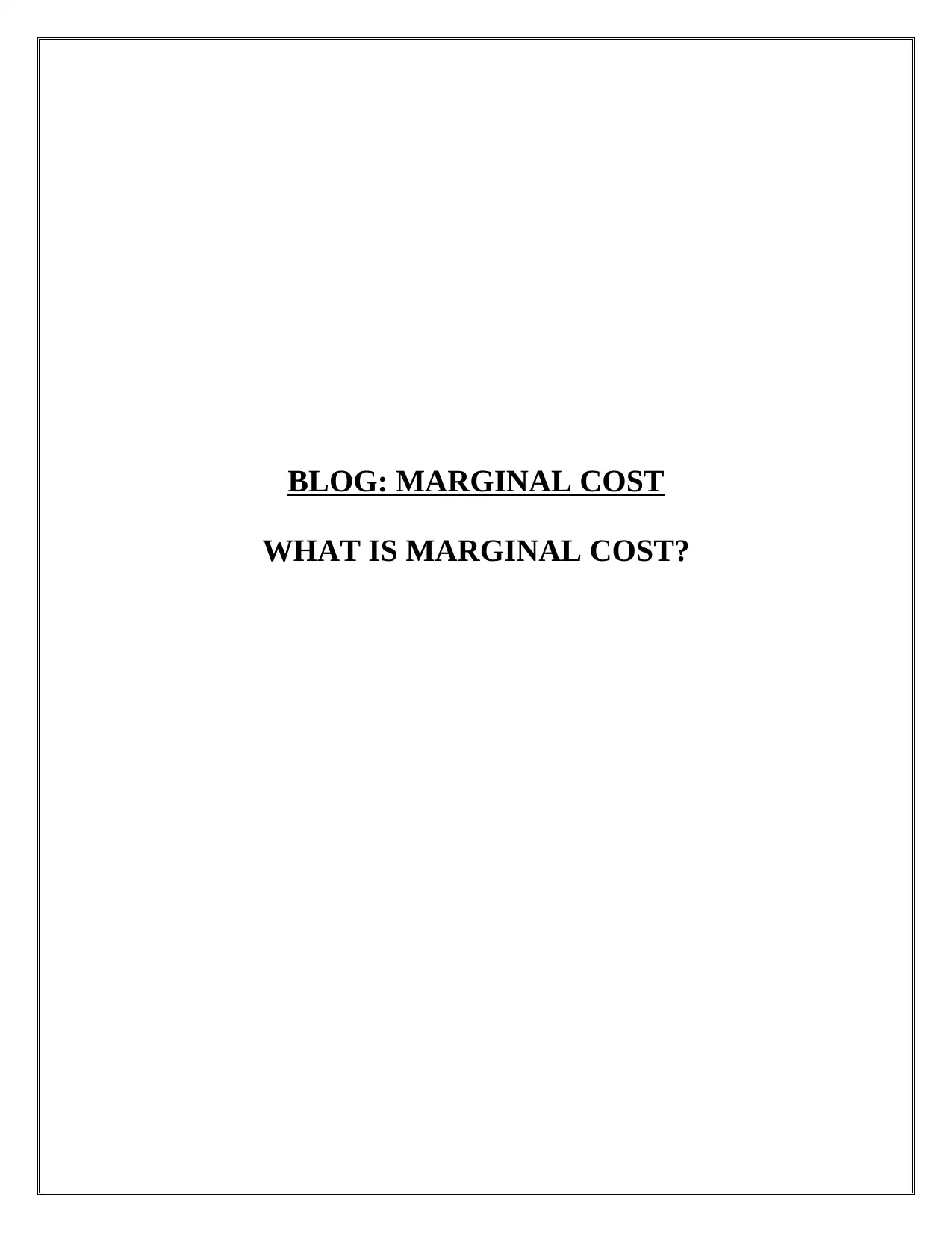
BLOG: MARGINAL COST
WHAT IS MARGINAL COST?
WHAT IS MARGINAL COST?
Paraphrase This Document
Need a fresh take? Get an instant paraphrase of this document with our AI Paraphraser
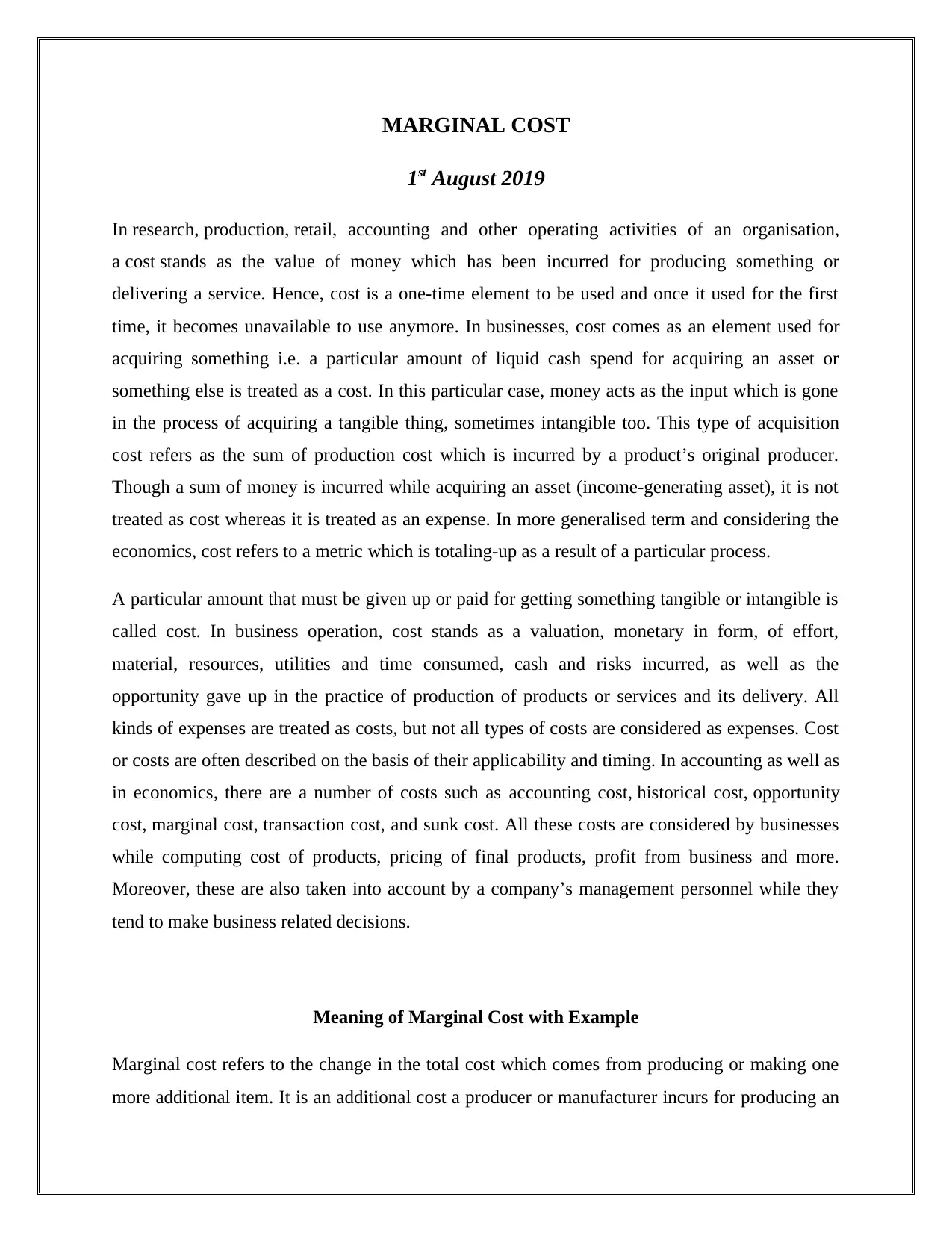
MARGINAL COST
1st August 2019
In research, production, retail, accounting and other operating activities of an organisation,
a cost stands as the value of money which has been incurred for producing something or
delivering a service. Hence, cost is a one-time element to be used and once it used for the first
time, it becomes unavailable to use anymore. In businesses, cost comes as an element used for
acquiring something i.e. a particular amount of liquid cash spend for acquiring an asset or
something else is treated as a cost. In this particular case, money acts as the input which is gone
in the process of acquiring a tangible thing, sometimes intangible too. This type of acquisition
cost refers as the sum of production cost which is incurred by a product’s original producer.
Though a sum of money is incurred while acquiring an asset (income-generating asset), it is not
treated as cost whereas it is treated as an expense. In more generalised term and considering the
economics, cost refers to a metric which is totaling-up as a result of a particular process.
A particular amount that must be given up or paid for getting something tangible or intangible is
called cost. In business operation, cost stands as a valuation, monetary in form, of effort,
material, resources, utilities and time consumed, cash and risks incurred, as well as the
opportunity gave up in the practice of production of products or services and its delivery. All
kinds of expenses are treated as costs, but not all types of costs are considered as expenses. Cost
or costs are often described on the basis of their applicability and timing. In accounting as well as
in economics, there are a number of costs such as accounting cost, historical cost, opportunity
cost, marginal cost, transaction cost, and sunk cost. All these costs are considered by businesses
while computing cost of products, pricing of final products, profit from business and more.
Moreover, these are also taken into account by a company’s management personnel while they
tend to make business related decisions.
Meaning of Marginal Cost with Example
Marginal cost refers to the change in the total cost which comes from producing or making one
more additional item. It is an additional cost a producer or manufacturer incurs for producing an
1st August 2019
In research, production, retail, accounting and other operating activities of an organisation,
a cost stands as the value of money which has been incurred for producing something or
delivering a service. Hence, cost is a one-time element to be used and once it used for the first
time, it becomes unavailable to use anymore. In businesses, cost comes as an element used for
acquiring something i.e. a particular amount of liquid cash spend for acquiring an asset or
something else is treated as a cost. In this particular case, money acts as the input which is gone
in the process of acquiring a tangible thing, sometimes intangible too. This type of acquisition
cost refers as the sum of production cost which is incurred by a product’s original producer.
Though a sum of money is incurred while acquiring an asset (income-generating asset), it is not
treated as cost whereas it is treated as an expense. In more generalised term and considering the
economics, cost refers to a metric which is totaling-up as a result of a particular process.
A particular amount that must be given up or paid for getting something tangible or intangible is
called cost. In business operation, cost stands as a valuation, monetary in form, of effort,
material, resources, utilities and time consumed, cash and risks incurred, as well as the
opportunity gave up in the practice of production of products or services and its delivery. All
kinds of expenses are treated as costs, but not all types of costs are considered as expenses. Cost
or costs are often described on the basis of their applicability and timing. In accounting as well as
in economics, there are a number of costs such as accounting cost, historical cost, opportunity
cost, marginal cost, transaction cost, and sunk cost. All these costs are considered by businesses
while computing cost of products, pricing of final products, profit from business and more.
Moreover, these are also taken into account by a company’s management personnel while they
tend to make business related decisions.
Meaning of Marginal Cost with Example
Marginal cost refers to the change in the total cost which comes from producing or making one
more additional item. It is an additional cost a producer or manufacturer incurs for producing an
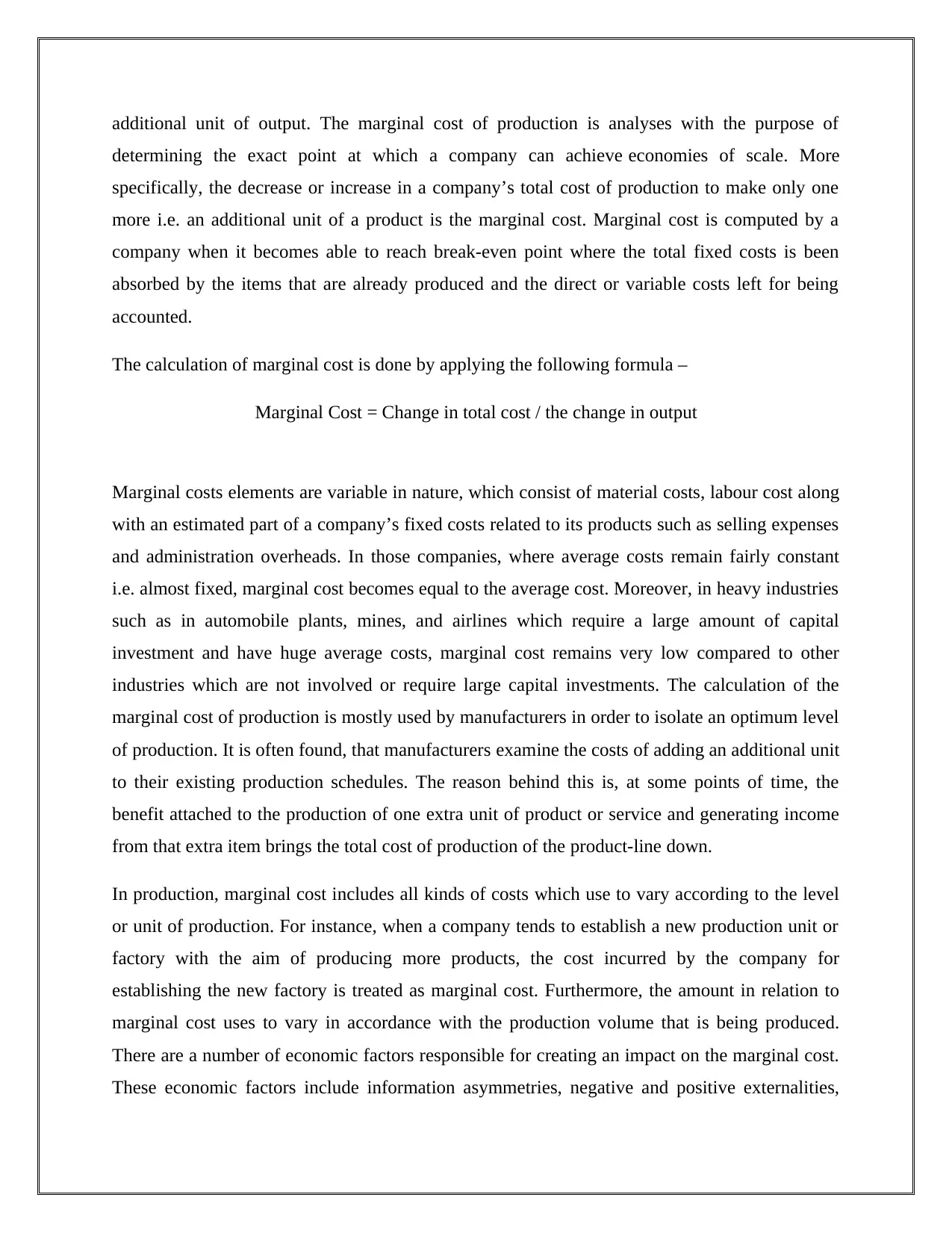
additional unit of output. The marginal cost of production is analyses with the purpose of
determining the exact point at which a company can achieve economies of scale. More
specifically, the decrease or increase in a company’s total cost of production to make only one
more i.e. an additional unit of a product is the marginal cost. Marginal cost is computed by a
company when it becomes able to reach break-even point where the total fixed costs is been
absorbed by the items that are already produced and the direct or variable costs left for being
accounted.
The calculation of marginal cost is done by applying the following formula –
Marginal Cost = Change in total cost / the change in output
Marginal costs elements are variable in nature, which consist of material costs, labour cost along
with an estimated part of a company’s fixed costs related to its products such as selling expenses
and administration overheads. In those companies, where average costs remain fairly constant
i.e. almost fixed, marginal cost becomes equal to the average cost. Moreover, in heavy industries
such as in automobile plants, mines, and airlines which require a large amount of capital
investment and have huge average costs, marginal cost remains very low compared to other
industries which are not involved or require large capital investments. The calculation of the
marginal cost of production is mostly used by manufacturers in order to isolate an optimum level
of production. It is often found, that manufacturers examine the costs of adding an additional unit
to their existing production schedules. The reason behind this is, at some points of time, the
benefit attached to the production of one extra unit of product or service and generating income
from that extra item brings the total cost of production of the product-line down.
In production, marginal cost includes all kinds of costs which use to vary according to the level
or unit of production. For instance, when a company tends to establish a new production unit or
factory with the aim of producing more products, the cost incurred by the company for
establishing the new factory is treated as marginal cost. Furthermore, the amount in relation to
marginal cost uses to vary in accordance with the production volume that is being produced.
There are a number of economic factors responsible for creating an impact on the marginal cost.
These economic factors include information asymmetries, negative and positive externalities,
determining the exact point at which a company can achieve economies of scale. More
specifically, the decrease or increase in a company’s total cost of production to make only one
more i.e. an additional unit of a product is the marginal cost. Marginal cost is computed by a
company when it becomes able to reach break-even point where the total fixed costs is been
absorbed by the items that are already produced and the direct or variable costs left for being
accounted.
The calculation of marginal cost is done by applying the following formula –
Marginal Cost = Change in total cost / the change in output
Marginal costs elements are variable in nature, which consist of material costs, labour cost along
with an estimated part of a company’s fixed costs related to its products such as selling expenses
and administration overheads. In those companies, where average costs remain fairly constant
i.e. almost fixed, marginal cost becomes equal to the average cost. Moreover, in heavy industries
such as in automobile plants, mines, and airlines which require a large amount of capital
investment and have huge average costs, marginal cost remains very low compared to other
industries which are not involved or require large capital investments. The calculation of the
marginal cost of production is mostly used by manufacturers in order to isolate an optimum level
of production. It is often found, that manufacturers examine the costs of adding an additional unit
to their existing production schedules. The reason behind this is, at some points of time, the
benefit attached to the production of one extra unit of product or service and generating income
from that extra item brings the total cost of production of the product-line down.
In production, marginal cost includes all kinds of costs which use to vary according to the level
or unit of production. For instance, when a company tends to establish a new production unit or
factory with the aim of producing more products, the cost incurred by the company for
establishing the new factory is treated as marginal cost. Furthermore, the amount in relation to
marginal cost uses to vary in accordance with the production volume that is being produced.
There are a number of economic factors responsible for creating an impact on the marginal cost.
These economic factors include information asymmetries, negative and positive externalities,
⊘ This is a preview!⊘
Do you want full access?
Subscribe today to unlock all pages.

Trusted by 1+ million students worldwide
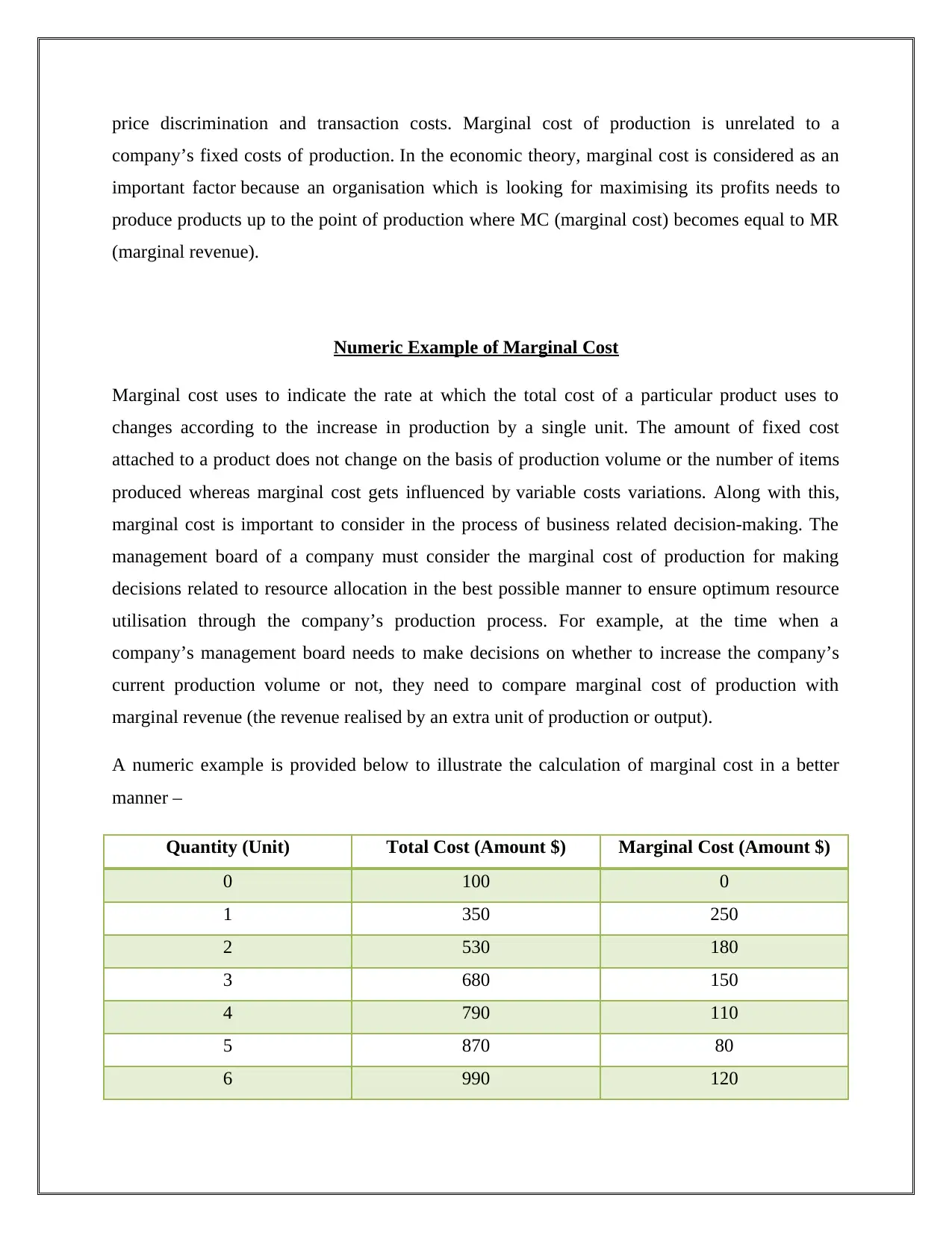
price discrimination and transaction costs. Marginal cost of production is unrelated to a
company’s fixed costs of production. In the economic theory, marginal cost is considered as an
important factor because an organisation which is looking for maximising its profits needs to
produce products up to the point of production where MC (marginal cost) becomes equal to MR
(marginal revenue).
Numeric Example of Marginal Cost
Marginal cost uses to indicate the rate at which the total cost of a particular product uses to
changes according to the increase in production by a single unit. The amount of fixed cost
attached to a product does not change on the basis of production volume or the number of items
produced whereas marginal cost gets influenced by variable costs variations. Along with this,
marginal cost is important to consider in the process of business related decision-making. The
management board of a company must consider the marginal cost of production for making
decisions related to resource allocation in the best possible manner to ensure optimum resource
utilisation through the company’s production process. For example, at the time when a
company’s management board needs to make decisions on whether to increase the company’s
current production volume or not, they need to compare marginal cost of production with
marginal revenue (the revenue realised by an extra unit of production or output).
A numeric example is provided below to illustrate the calculation of marginal cost in a better
manner –
Quantity (Unit) Total Cost (Amount $) Marginal Cost (Amount $)
0 100 0
1 350 250
2 530 180
3 680 150
4 790 110
5 870 80
6 990 120
company’s fixed costs of production. In the economic theory, marginal cost is considered as an
important factor because an organisation which is looking for maximising its profits needs to
produce products up to the point of production where MC (marginal cost) becomes equal to MR
(marginal revenue).
Numeric Example of Marginal Cost
Marginal cost uses to indicate the rate at which the total cost of a particular product uses to
changes according to the increase in production by a single unit. The amount of fixed cost
attached to a product does not change on the basis of production volume or the number of items
produced whereas marginal cost gets influenced by variable costs variations. Along with this,
marginal cost is important to consider in the process of business related decision-making. The
management board of a company must consider the marginal cost of production for making
decisions related to resource allocation in the best possible manner to ensure optimum resource
utilisation through the company’s production process. For example, at the time when a
company’s management board needs to make decisions on whether to increase the company’s
current production volume or not, they need to compare marginal cost of production with
marginal revenue (the revenue realised by an extra unit of production or output).
A numeric example is provided below to illustrate the calculation of marginal cost in a better
manner –
Quantity (Unit) Total Cost (Amount $) Marginal Cost (Amount $)
0 100 0
1 350 250
2 530 180
3 680 150
4 790 110
5 870 80
6 990 120
Paraphrase This Document
Need a fresh take? Get an instant paraphrase of this document with our AI Paraphraser
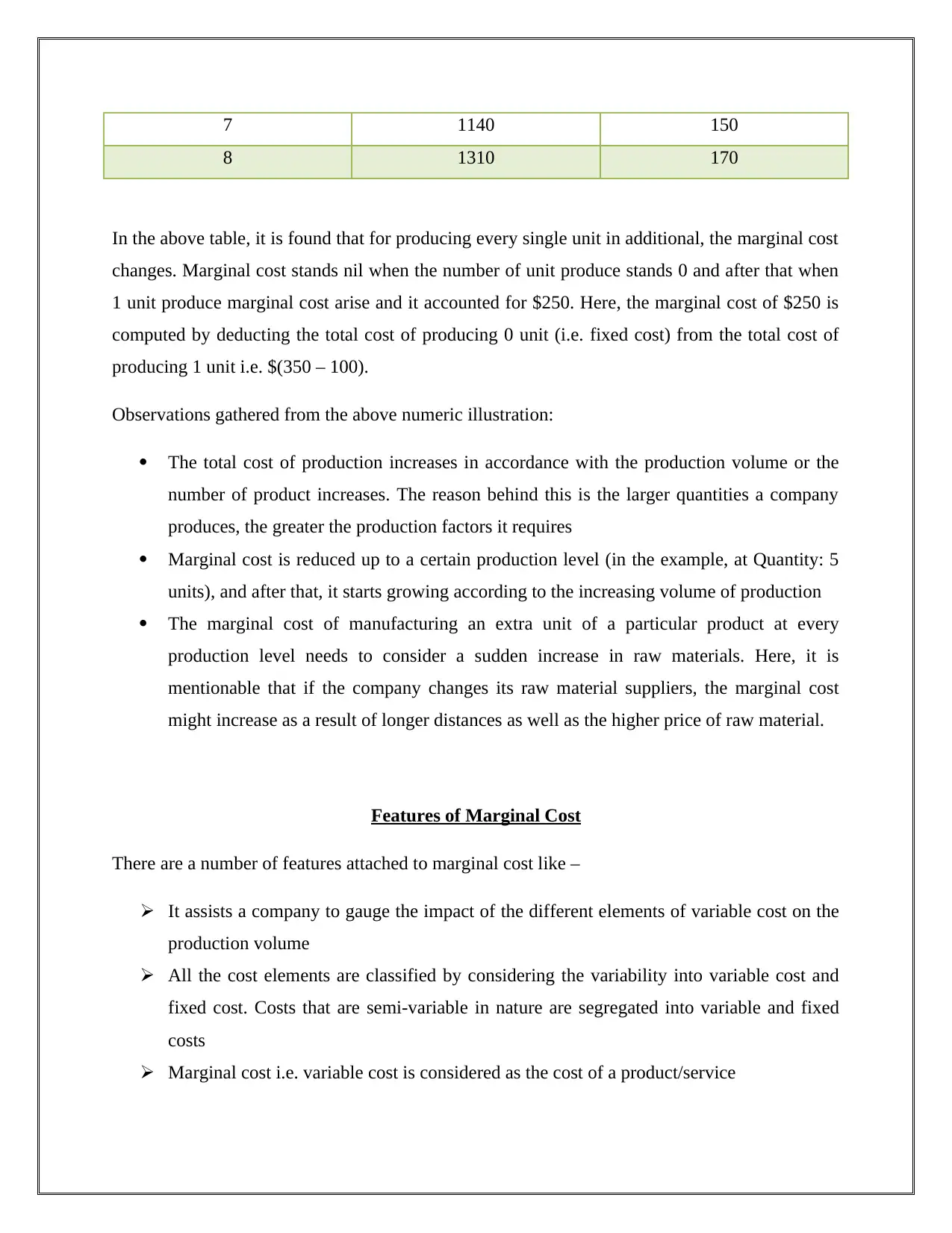
7 1140 150
8 1310 170
In the above table, it is found that for producing every single unit in additional, the marginal cost
changes. Marginal cost stands nil when the number of unit produce stands 0 and after that when
1 unit produce marginal cost arise and it accounted for $250. Here, the marginal cost of $250 is
computed by deducting the total cost of producing 0 unit (i.e. fixed cost) from the total cost of
producing 1 unit i.e. $(350 – 100).
Observations gathered from the above numeric illustration:
The total cost of production increases in accordance with the production volume or the
number of product increases. The reason behind this is the larger quantities a company
produces, the greater the production factors it requires
Marginal cost is reduced up to a certain production level (in the example, at Quantity: 5
units), and after that, it starts growing according to the increasing volume of production
The marginal cost of manufacturing an extra unit of a particular product at every
production level needs to consider a sudden increase in raw materials. Here, it is
mentionable that if the company changes its raw material suppliers, the marginal cost
might increase as a result of longer distances as well as the higher price of raw material.
Features of Marginal Cost
There are a number of features attached to marginal cost like –
It assists a company to gauge the impact of the different elements of variable cost on the
production volume
All the cost elements are classified by considering the variability into variable cost and
fixed cost. Costs that are semi-variable in nature are segregated into variable and fixed
costs
Marginal cost i.e. variable cost is considered as the cost of a product/service
8 1310 170
In the above table, it is found that for producing every single unit in additional, the marginal cost
changes. Marginal cost stands nil when the number of unit produce stands 0 and after that when
1 unit produce marginal cost arise and it accounted for $250. Here, the marginal cost of $250 is
computed by deducting the total cost of producing 0 unit (i.e. fixed cost) from the total cost of
producing 1 unit i.e. $(350 – 100).
Observations gathered from the above numeric illustration:
The total cost of production increases in accordance with the production volume or the
number of product increases. The reason behind this is the larger quantities a company
produces, the greater the production factors it requires
Marginal cost is reduced up to a certain production level (in the example, at Quantity: 5
units), and after that, it starts growing according to the increasing volume of production
The marginal cost of manufacturing an extra unit of a particular product at every
production level needs to consider a sudden increase in raw materials. Here, it is
mentionable that if the company changes its raw material suppliers, the marginal cost
might increase as a result of longer distances as well as the higher price of raw material.
Features of Marginal Cost
There are a number of features attached to marginal cost like –
It assists a company to gauge the impact of the different elements of variable cost on the
production volume
All the cost elements are classified by considering the variability into variable cost and
fixed cost. Costs that are semi-variable in nature are segregated into variable and fixed
costs
Marginal cost i.e. variable cost is considered as the cost of a product/service
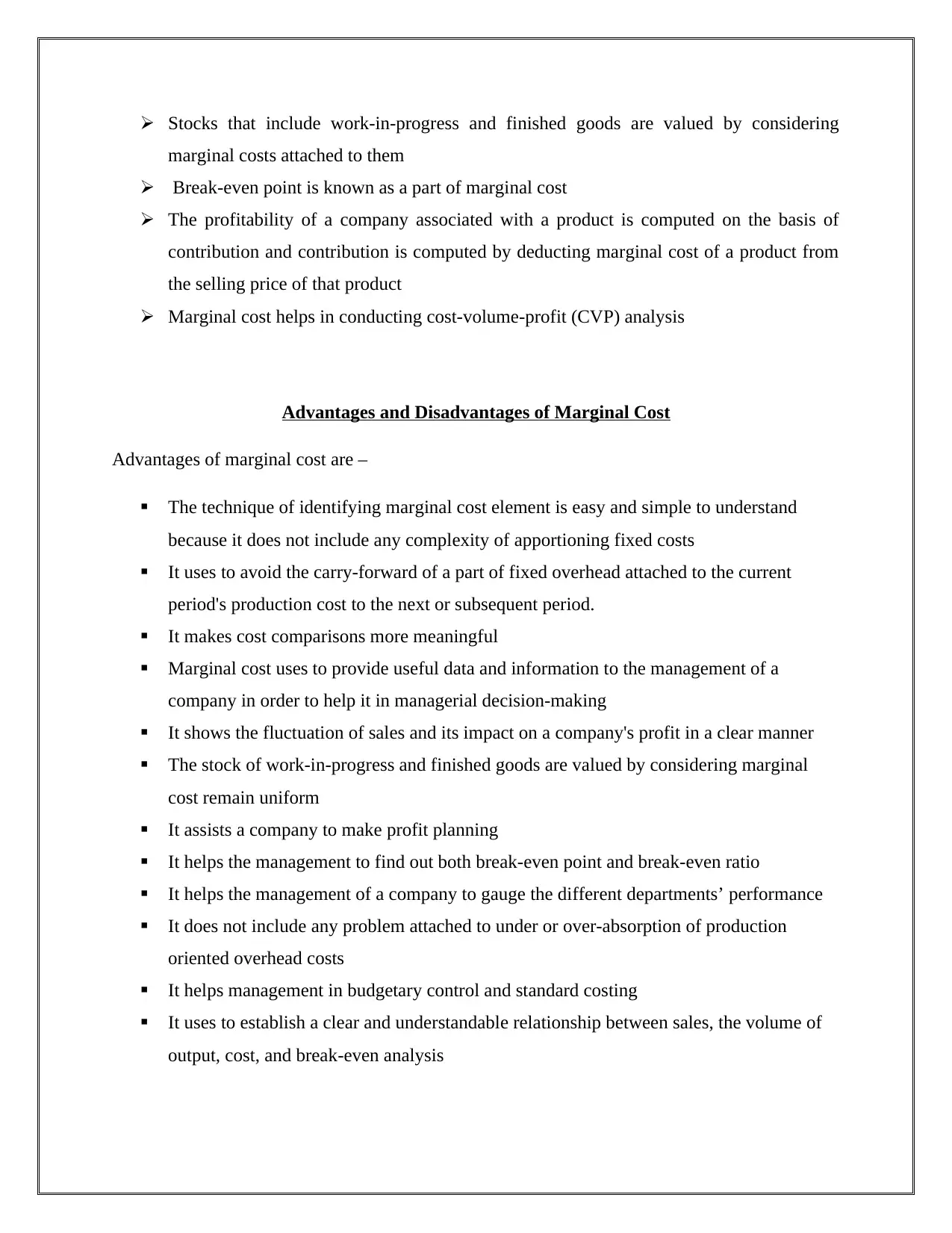
Stocks that include work-in-progress and finished goods are valued by considering
marginal costs attached to them
Break-even point is known as a part of marginal cost
The profitability of a company associated with a product is computed on the basis of
contribution and contribution is computed by deducting marginal cost of a product from
the selling price of that product
Marginal cost helps in conducting cost-volume-profit (CVP) analysis
Advantages and Disadvantages of Marginal Cost
Advantages of marginal cost are –
The technique of identifying marginal cost element is easy and simple to understand
because it does not include any complexity of apportioning fixed costs
It uses to avoid the carry-forward of a part of fixed overhead attached to the current
period's production cost to the next or subsequent period.
It makes cost comparisons more meaningful
Marginal cost uses to provide useful data and information to the management of a
company in order to help it in managerial decision-making
It shows the fluctuation of sales and its impact on a company's profit in a clear manner
The stock of work-in-progress and finished goods are valued by considering marginal
cost remain uniform
It assists a company to make profit planning
It helps the management to find out both break-even point and break-even ratio
It helps the management of a company to gauge the different departments’ performance
It does not include any problem attached to under or over-absorption of production
oriented overhead costs
It helps management in budgetary control and standard costing
It uses to establish a clear and understandable relationship between sales, the volume of
output, cost, and break-even analysis
marginal costs attached to them
Break-even point is known as a part of marginal cost
The profitability of a company associated with a product is computed on the basis of
contribution and contribution is computed by deducting marginal cost of a product from
the selling price of that product
Marginal cost helps in conducting cost-volume-profit (CVP) analysis
Advantages and Disadvantages of Marginal Cost
Advantages of marginal cost are –
The technique of identifying marginal cost element is easy and simple to understand
because it does not include any complexity of apportioning fixed costs
It uses to avoid the carry-forward of a part of fixed overhead attached to the current
period's production cost to the next or subsequent period.
It makes cost comparisons more meaningful
Marginal cost uses to provide useful data and information to the management of a
company in order to help it in managerial decision-making
It shows the fluctuation of sales and its impact on a company's profit in a clear manner
The stock of work-in-progress and finished goods are valued by considering marginal
cost remain uniform
It assists a company to make profit planning
It helps the management to find out both break-even point and break-even ratio
It helps the management of a company to gauge the different departments’ performance
It does not include any problem attached to under or over-absorption of production
oriented overhead costs
It helps management in budgetary control and standard costing
It uses to establish a clear and understandable relationship between sales, the volume of
output, cost, and break-even analysis
⊘ This is a preview!⊘
Do you want full access?
Subscribe today to unlock all pages.

Trusted by 1+ million students worldwide
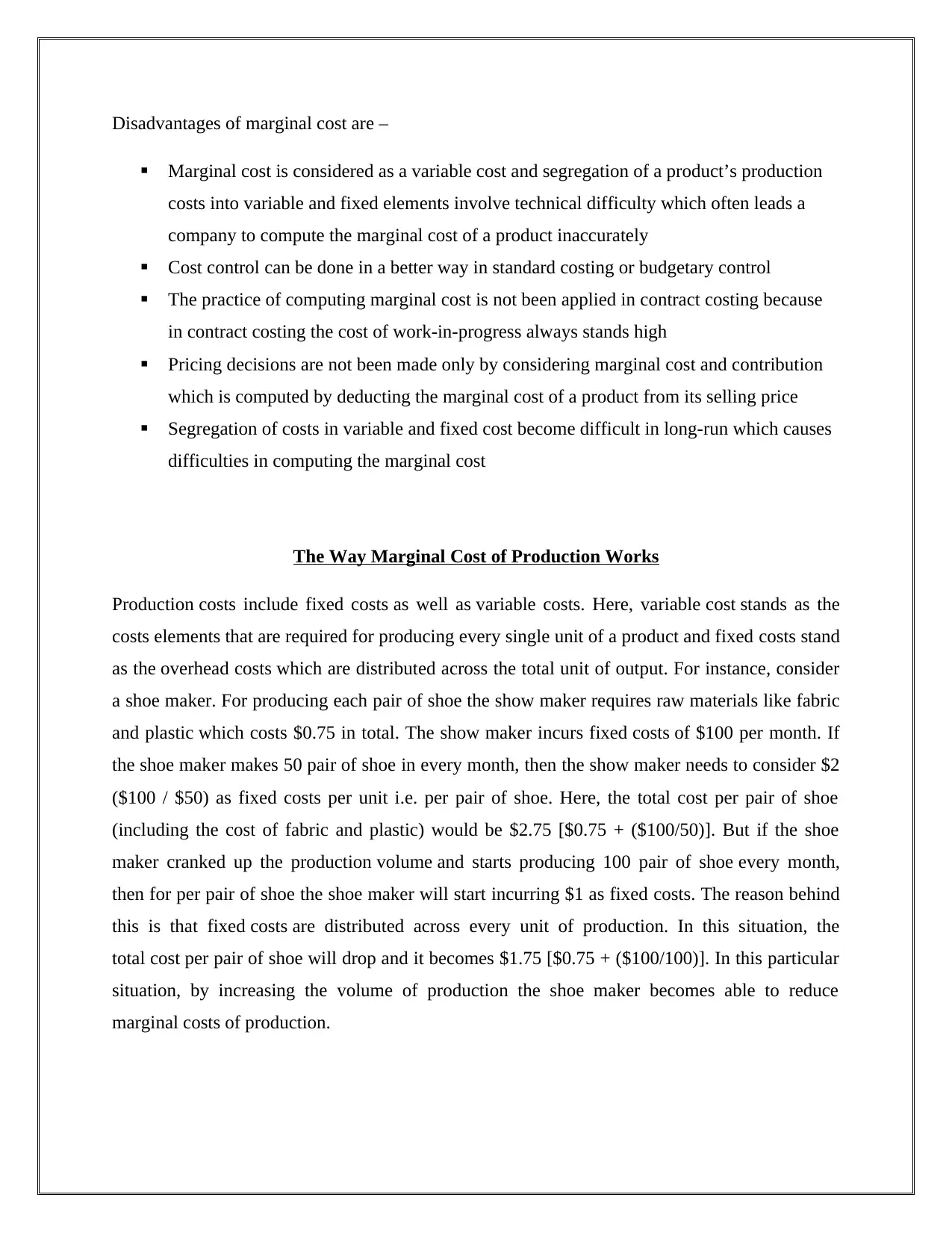
Disadvantages of marginal cost are –
Marginal cost is considered as a variable cost and segregation of a product’s production
costs into variable and fixed elements involve technical difficulty which often leads a
company to compute the marginal cost of a product inaccurately
Cost control can be done in a better way in standard costing or budgetary control
The practice of computing marginal cost is not been applied in contract costing because
in contract costing the cost of work-in-progress always stands high
Pricing decisions are not been made only by considering marginal cost and contribution
which is computed by deducting the marginal cost of a product from its selling price
Segregation of costs in variable and fixed cost become difficult in long-run which causes
difficulties in computing the marginal cost
The Way Marginal Cost of Production Works
Production costs include fixed costs as well as variable costs. Here, variable cost stands as the
costs elements that are required for producing every single unit of a product and fixed costs stand
as the overhead costs which are distributed across the total unit of output. For instance, consider
a shoe maker. For producing each pair of shoe the show maker requires raw materials like fabric
and plastic which costs $0.75 in total. The show maker incurs fixed costs of $100 per month. If
the shoe maker makes 50 pair of shoe in every month, then the show maker needs to consider $2
($100 / $50) as fixed costs per unit i.e. per pair of shoe. Here, the total cost per pair of shoe
(including the cost of fabric and plastic) would be $2.75 [$0.75 + ($100/50)]. But if the shoe
maker cranked up the production volume and starts producing 100 pair of shoe every month,
then for per pair of shoe the shoe maker will start incurring $1 as fixed costs. The reason behind
this is that fixed costs are distributed across every unit of production. In this situation, the
total cost per pair of shoe will drop and it becomes $1.75 [$0.75 + ($100/100)]. In this particular
situation, by increasing the volume of production the shoe maker becomes able to reduce
marginal costs of production.
Marginal cost is considered as a variable cost and segregation of a product’s production
costs into variable and fixed elements involve technical difficulty which often leads a
company to compute the marginal cost of a product inaccurately
Cost control can be done in a better way in standard costing or budgetary control
The practice of computing marginal cost is not been applied in contract costing because
in contract costing the cost of work-in-progress always stands high
Pricing decisions are not been made only by considering marginal cost and contribution
which is computed by deducting the marginal cost of a product from its selling price
Segregation of costs in variable and fixed cost become difficult in long-run which causes
difficulties in computing the marginal cost
The Way Marginal Cost of Production Works
Production costs include fixed costs as well as variable costs. Here, variable cost stands as the
costs elements that are required for producing every single unit of a product and fixed costs stand
as the overhead costs which are distributed across the total unit of output. For instance, consider
a shoe maker. For producing each pair of shoe the show maker requires raw materials like fabric
and plastic which costs $0.75 in total. The show maker incurs fixed costs of $100 per month. If
the shoe maker makes 50 pair of shoe in every month, then the show maker needs to consider $2
($100 / $50) as fixed costs per unit i.e. per pair of shoe. Here, the total cost per pair of shoe
(including the cost of fabric and plastic) would be $2.75 [$0.75 + ($100/50)]. But if the shoe
maker cranked up the production volume and starts producing 100 pair of shoe every month,
then for per pair of shoe the shoe maker will start incurring $1 as fixed costs. The reason behind
this is that fixed costs are distributed across every unit of production. In this situation, the
total cost per pair of shoe will drop and it becomes $1.75 [$0.75 + ($100/100)]. In this particular
situation, by increasing the volume of production the shoe maker becomes able to reduce
marginal costs of production.
1 out of 7
Related Documents
Your All-in-One AI-Powered Toolkit for Academic Success.
+13062052269
info@desklib.com
Available 24*7 on WhatsApp / Email
![[object Object]](/_next/static/media/star-bottom.7253800d.svg)
Unlock your academic potential
Copyright © 2020–2026 A2Z Services. All Rights Reserved. Developed and managed by ZUCOL.




